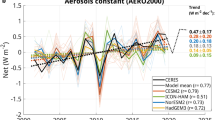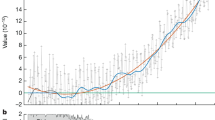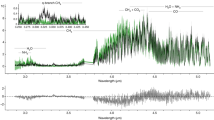Abstract
IN 1966 we determined the coefficients of the odd zonal harmonics in the Earth's gravitational potential from an analysis of fourteen satellite orbits1, chosen to give the widest and most uniform possible coverage in inclination to the equator and semi major axis. We found quite large values for the fifteenth and twenty-first harmonic coefficients, J15 and J21 in the usual notation1. This indicated the need to carry the evaluation to coefficients of still higher order.
This is a preview of subscription content, access via your institution
Access options
Subscribe to this journal
Receive 51 print issues and online access
$199.00 per year
only $3.90 per issue
Buy this article
- Purchase on Springer Link
- Instant access to full article PDF
Prices may be subject to local taxes which are calculated during checkout
Similar content being viewed by others
References
King-Hele, D. G., Cook, G. E., and Scott, D. W., Planet. Space Sci., 15, 741 (1967).
King-Hele, D. G., Cook, G. E., and Scott, D. W., RAE Tech. Rep. 68202 (1968).
Kozai, Y., Publ. Astro. Soc. Japan, 16, 263 (1964).
Author information
Authors and Affiliations
Rights and permissions
About this article
Cite this article
KING-HELE, D., COOK, G. & SCOTT, D. New Evaluation of Odd Zonal Harmonics in the Geopotential. Nature 219, 1143–1144 (1968). https://doi.org/10.1038/2191143a0
Received:
Issue Date:
DOI: https://doi.org/10.1038/2191143a0
Comments
By submitting a comment you agree to abide by our Terms and Community Guidelines. If you find something abusive or that does not comply with our terms or guidelines please flag it as inappropriate.



